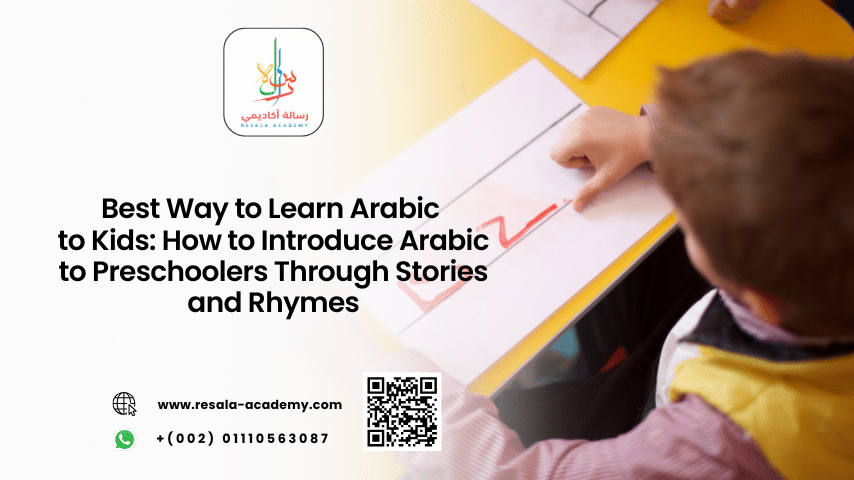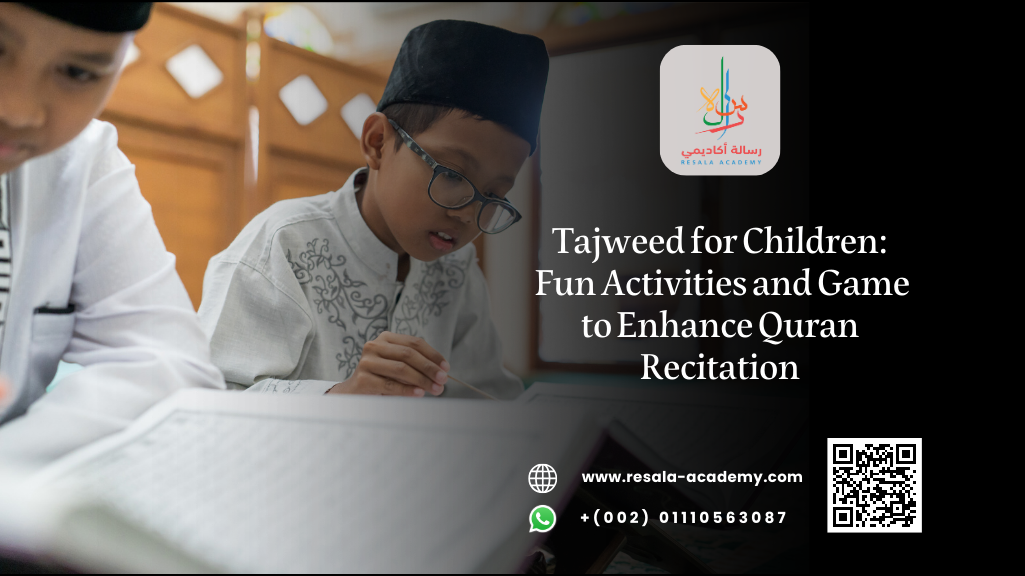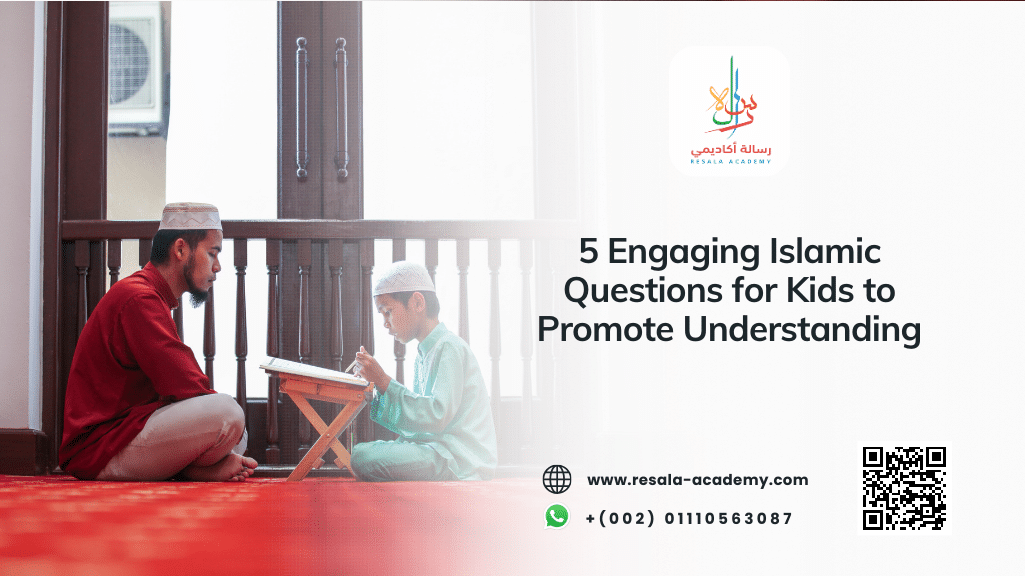Table of Contents
Best Way to Learn Arabic to Kids: How to Introduce Arabic to Preschoolers Through Stories and Rhymes
Arabic is one of the world’s most beautiful and expressive languages, and its significance is magnified for Muslims as it is the language of the Quran.
Teaching Arabic to children, especially non-native speakers, can be a rewarding experience when approached creatively.
This article explores the best way to learn Arabic for kids, focusing on introducing Arabic to preschoolers through engaging methods like stories and rhymes.
Whether you’re a parent, teacher, or part of an online academy like Resala Academy, this guide will provide you with actionable steps to ensure your child’s journey in learning Arabic is both effective and enjoyable.
Why Teach Arabic to Kids Early?
Introducing Arabic to children at a young age has numerous benefits:
- Language Absorption: Preschoolers have a remarkable ability to absorb new languages effortlessly. This is the perfect stage to introduce Arabic.
- Cultural and Religious Connection: Learning Arabic helps children connect with Islamic teachings and understand the Quran in its original language.
- Cognitive Development: Studies show that learning a second language enhances cognitive skills, problem-solving abilities, and memory.
By starting early, children can develop a strong foundation in Arabic, which will serve them throughout their lives.
The Importance of Arabic for Kids
Arabic holds a special place in the hearts of Muslims. It is the language in which Allah revealed the Quran to Prophet Muhammad (ﷺ). Teaching children Arabic not only helps them understand the Quran but also instills a deep love for their faith.
Evidence from the Quran and Hadith
- The Quran Encourages Understanding Its Language. Allah says in the Quran:
إِنَّآ أَنزَلْنَـٰهُ قُرْءَٰنًا عَرَبِيًّۭا لَّعَلَّكُمْ تَعْقِلُونَ
“Indeed, We have sent it down as an Arabic Quran that you might understand.”
- The Prophet (ﷺ) Emphasized Teaching the Quran. The Prophet Muhammad (ﷺ) said:
“ خَيْرُكُمْ مَنْ تَعَلَّمَ الْقُرْآنَ وَعَلَّمَهُ ”
“The best of you are those who learn the Quran and teach it.”
These references highlight the importance of teaching Arabic to children, ensuring they grow up with a strong connection to their faith.
Best Way to Learn Arabic for Kids: Strategies That Work
Teaching Arabic to preschoolers requires a blend of creativity, patience, and consistency. Here are some proven methods:
Use Stories to Spark Interest
Children love stories, and they are a fantastic way to introduce Arabic vocabulary and Quranic concepts. Start with simple tales from Islamic history or stories of the Prophets. For example:
- Story of Prophet Yunus (عليه السلام): Teach children the story of Prophet Yunus and introduce Arabic words like “الحوت” (the whale) and “دعاء” (supplication).
- Story of the Creation: Narrate how Allah created the world, using Arabic words like “سماء” (sky) and “أرض” (earth).
Pro Tip: Use picture books with Arabic text and translations to make the experience more engaging.
Incorporate Rhymes and Songs
Rhymes and songs are excellent tools for teaching Arabic to preschoolers. They make learning fun and help children remember new words and phrases. Examples include:
- Alphabet Songs: Teach the Arabic alphabet through catchy tunes.
Interactive Games and Activities
Children learn best when they’re having fun. Incorporate games and activities into their Arabic lessons:
- Flashcards: Use colorful flashcards with Arabic letters, words, and pictures.
- Matching Games: Match Arabic words to their corresponding images.
- Role-Playing: Act out scenarios like shopping or visiting a mosque, using Arabic phrases.
Introduce Quranic Arabic Gradually
Start with short and simple Quranic verses. Focus on:
- Basic Vocabulary: Teach words commonly found in the Quran, such as “نور” (light), “كتاب” (book), and “سلام” (peace).
- Tajweed Basics: Playfully introduce the rules of pronunciation.
Tip: Enroll your child in an online academy like Resala Academy, which specializes in teaching Quranic Arabic to non-native speakers.
Leverage Technology
In today’s digital age, there are countless apps, videos, and online platforms designed to teach Arabic to kids. Some popular options include:
- Interactive Apps: Apps like “Alif Baa Taa” and “Quran Companion” make learning Arabic fun and interactive.
- Online Classes: Platforms like Resala Academy offer structured courses tailored for children.
Role of Resala Academy in Teaching Arabic and Quran
Resala Academy is a leading online platform that specializes in teaching Arabic and the Quran to non-native speakers.
Their programs are designed to cater to children of all ages, ensuring they learn engagingly and effectively.
With experienced teachers, interactive lessons, and a focus on Quranic Arabic course, Resala Academy is the perfect choice for parents looking to give their children a head start in Arabic.
Benefits of Learning Arabic Through Stories and Rhymes
Using stories and rhymes to teach Arabic has several advantages:
- Enhanced Retention: Stories and rhymes make it easier for children to remember new words.
- Cultural Exposure: They introduce children to Islamic culture and values.
- Improved Listening Skills: Listening to stories and rhymes helps children develop their comprehension skills.
By incorporating these methods, parents and teachers can create a fun and immersive learning experience for kids.
Start Your Child’s Arabic Learning Journey with Resala Academy Now!
If you’re looking for the best way to learn Arabic for your child, look no further than Resala Academy.
With expert instructors, engaging lessons, and a focus on Arabic for Kids Course, Resala Academy provides a comprehensive learning experience for non-native speakers.
Don’t wait! Give your child the gift of understanding the Quran and mastering Arabic. Enroll in Resala Academy today and watch them thrive in their journey of faith and language.
FAQs
What is the best age to start teaching Arabic to kids?
The best age to start teaching Arabic is during the preschool years (3-5 years old). At this age, children are highly receptive to new languages and can absorb information quickly.
How can I make Arabic learning fun for my child?
You can make Arabic learning fun by using stories, rhymes, games, and interactive apps. Enrolling in platforms like Resala Academy also ensures engaging and structured lessons.
Why is Quranic Arabic important for children?
Quranic Arabic helps children understand the Quran in its original language, deepening their connection to Islam and enhancing their spiritual growth.
Can non-native speakers learn Arabic easily?
Yes, with the right methods and resources, non-native speakers can learn Arabic easily. Platforms like Resala Academy specialize in teaching Arabic to non-native speakers.
What resources are best for teaching Arabic to kids?
The best resources include Arabic storybooks, rhymes, flashcards, apps, and online classes like those offered by Resala Academy.
Conclusion
Teaching Arabic to children, especially Quran Qaida, is a noble endeavor that strengthens their connection to their faith and heritage.
By using engaging methods like stories, rhymes, and interactive games, parents and teachers can make the learning process enjoyable and effective.
Platforms like Resala Academy play a crucial role in providing structured and engaging lessons for non-native speakers.
Start your child’s Arabic journey today and watch them grow in knowledge and faith.




